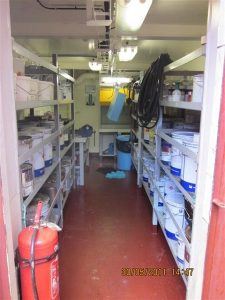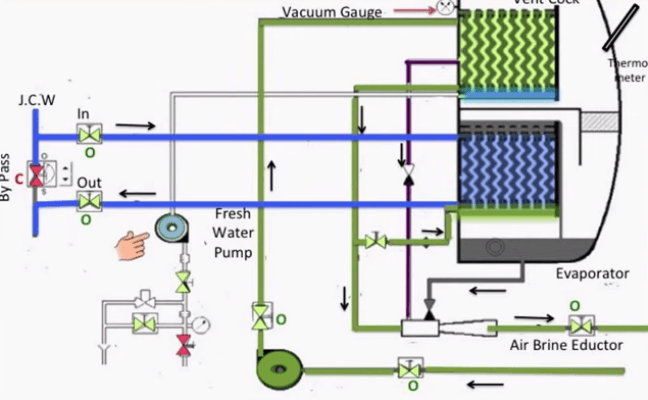8 Ways To Optimize Lubricating Oil Usage On Ships
Lubricating oils of different makes and grades are used on board ships. Most of the times, these oils are neither properly labeled nor carefully stored, leading to wrong usage by seafarers. On several occasions, during maintenance work or because of lack of proper routine checks, a lot of lubricating oil is wasted on ships.
Lubricating oils are both essential and expensive and seafarers must make extra efforts to prevent loss of such oils. Mentioned herein as eight ways in which usage of lubricating oils can be optimized on ships.
1. Study Lubricating Oil Characteristics
Seafarers generally do not study lubricating oil characteristics till the time comes for its usage on a particular machinery. At such times wrong decisions are often taken while selecting the lube oil. Mariners much devote time to study characteristics of lube oils and other important compounds before actually using them on ships.
Leakages of lubricating oils must be tackled, especially on deck and engine room pipe lines to prevent wastage and accidents due to slipping. This includes checking of leakages at mooring stations and in deck crane houses and power packs. Some older vessels consume even 400-500 liters of lube oil per month on these systems. Keeping a close watch on ships by following proper watch keeping procedures can help a great way in reducing unnecessary loss of lube oils.
3. Proper Filtration is Important
Lubricating oils in modern diesel engines are used for reducing friction, preventing corrosion and acting as a cooling medium. This makes purification and filtration of such oils of utmost importance. Filter cleaning should not to be left to motorman alone and chief or second engineer must check the filters before cleaning and boxing up after cleaning.
4. Regular Testing of Lube Oil is Necessary
On board analysis of lubricating oil must be carried out and regular testing by shore laboratory every 3-6 month as per company procedure. The sample should be taken after the separation and filtration of oil, before it goes into the engine. A responsible engineer should collect the samples. Oil suppliers give good instructions on sampling points and procedures, which should be followed.
5. Check Viscosity of Oils
The viscosity of lubricating oil could be expected to increase gradually during operations due to oxidation and polymerization of oil compounds and increase of solid contents in the oil. Main engine crankcase oil should be regularly replenished with fresh oil should be supplied to keep the sump level sufficiently high in case of oil cooled pistons.
General reason for unexpected viscosity decrease of the oil could be due to fuel oil dilution such as diesel oil finding way into the crankcase. On main engines, good inspection of under piston spaces before cleaning is very indicative of faults.
6. Oil in Water is Dangerous
Water in oil is obviously dangerous. Maximum allowed water content in engine lubricating oil is 0.3 vol-% or weight -%. Water can find way to crankcase from strange places like a hole in the crankcase air vent on upper deck ( less frequented) or from a wasted manhole door joint below the floor plates on tank top ( rarely checked). Proper check must be made to prevent ingress of water into oil.
7. Close Monitoring of Lube Oil Usage in Machinery
Oil used in Air Compressors and other important machinery need to be closely monitored to check if enough lubrication is reaching the pistons and also if there is too much oil consumption. Lubrication on this machinery is generally neglected until some problem develops and, therefore, regular check and maintenance are required.
8. Education and Training are Important
These days there are good CD’s provided by Oil Companies and Purifier makers and these should be viewed and discussed on board ships. Manuals and other important guides for oils used on ships must also be studied for efficient usage on ships.
Lubricating oils are costly and good planning should be done for buying and storing them at the cheapest port. Shipping companies should also monitor any price rise of lube oils in near future and fill up the ship’s tanks beforehand accordingly.
Note : This is not an exhaustive list for optimizing lube oil usage on ships. However, these important points would help a lot in saving unnecessary wastage of lube oil on ships.
Disclaimer :
The information on this website is for general purposes only. While efforts are made to ensure accuracy, we make no warranties of any kind regarding completeness, reliability, or suitability. Any reliance you place on such information is at your own risk. We are not liable for any loss or damage arising from the use of this website.
Related Articles
Disclaimer :
The information on this website is for general purposes only. While efforts are made to ensure accuracy, we make no warranties of any kind regarding completeness, reliability, or suitability. Any reliance you place on such information is at your own risk. We are not liable for any loss or damage arising from the use of this website.
⚓️ Enhance Your Knowledge. Prevent Accidents. Stay Safe at Sea.
1. eBooks for Engine Department
Master machinery operations, troubleshooting, and safety procedures with expertly written guides tailored for marine engineers. Prevent costly breakdowns and onboard accidents through practical knowledge.
👉 Explore Engine Department eBooks
2. eBooks for Deck Department
Sharpen your seamanship, navigation, and cargo-handling skills with real-world case studies and practical insights designed for deck officers and cadets.
👉Discover Deck Department eBooks
3. eBooks on Electrical Fundamentals & Issues
Understand marine electrical systems, identify potential faults, and prevent onboard electrical failures with step-by-step explanations from industry experts.
4. Pocket Guides for Quick Reference
Compact, handy, and loaded with essential checklists—perfect for on-the-go reference during operations and emergencies at sea.
5. Combo Packs to Save Big
Access multiple expert eBooks at discounted prices. Ideal for professionals seeking complete safety and operational knowledge across various ship departments.
6. Digital Maritime Courses – Learn at Your Own Pace
Upgrade your competence with Marine Insight Academy’s online courses. Learn from industry professionals anytime, anywhere, and become a safer, smarter seafarer.

About Author
Mahendra Singh is a marine engineer with more than 20 years of experience as chief engineer on a variety of vessels such as bulk, container and car carriers. He has also served as an engineer and ship surveyor with the Government of India. When not sailing, Mahendra Singh likes to teach at maritime academies.
Subscribe To Our Daily Newsletter
By subscribing, you agree to our Privacy Policy and may receive occasional deal communications; you can unsubscribe anytime.






i hv question what will be to daily consumption of lub oil for 8800 dwt general cargo ship
brgds/ujmco
Dear Ismail,
The lube oil consumption will depend on Engine description and not DWT of ship
How to calculate Lube oil consumption for OSV /PSV in Idle and working condition
I really appreciate the insight here in this post and wanted to say thank you for sharing the information.